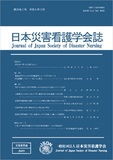Japanese
English
- 有料閲覧
- Abstract 文献概要
- 参考文献 Reference
要旨
目的:大規模災害の少ない地域で学ぶ看護学生の防災意識や防災対策の現状を明らかにすることで、平時の災害対策や地域に根差した看護教育の在り方を検討することである。方法:B大学で学ぶ看護学生を対象として、オンラインによる質問紙調査を行った。結果:研究参加者は111名であった。災害看護学の開講年度である3年生が他学年と比べてハザードマップの確認をしていた。被災して困った体験では、【避難生活を強いられる】【ライフラインの問題】【食料や生活物資の不足】【家財の破損】【精神的負担】の5カテゴリが挙げられた。自由記載ではA県で留意すべき強風や登山、運転に関しての配慮が記載されていた。結論:多くの学生が、将来自らの身体に被害が及ぶ災害が起こると考えているものの、防災意識や防災対策に結びついていない現状が明らかになった。地域特性を踏まえた教育を提供することや学生として学ぶだけでなく、教える立場を担うことで防災に対する行動につながっていくことが期待できる。
Abstract
Purpose: This study clarified the current situation of disaster prevention awareness, and actions of nursing students who receive training in areas with few massive disasters. We examined how disaster countermeasures are adopted under ordinary situations, and how nursing education is rooted in the community. Method: An online questionnaire survey was conducted of nursing students at B University. Results: There were 111 participants. The results revealed that third-year Disaster Nursing students checked the hazard map more than students in other grades. There were five categories of troubled experiences during disasters:[forced evacuation],[lifeline problems],[lack of food and daily necessities],[damage to household goods], and [mental burden]. The free responses described considerations related to strong winds, mountain climbing, and driving that should be engaged in prefecture A. Conclusion: Many students believe that disasters that threaten their safety will occur in the future, but the current situation does not lead to prevention awareness and action. It is expected that providing education based on the characteristics of the region and having students not only learn as students but also play a role in teaching themselves will lead to action for disaster prevention.
Copyright © 2023, Japan Society of Disaster Nursing All rights reserved.


